CSC/ECE 517 Spring 2023 - E2301. Refactor review maping helper: Difference between revisions
| (13 intermediate revisions by the same user not shown) | |||
| Line 17: | Line 17: | ||
==Changes Made== | ==Changes Made== | ||
'''1) Reduced lines of code by removing unnecessary line breaks in display_volume_metric_chart | '''1)def display_volume_metric_chart ''' | ||
Reduced lines of code by removing unnecessary line breaks in display_volume_metric_chart | |||
Before | Before | ||
| Line 126: | Line 128: | ||
end | end | ||
'''2) | |||
'''2) def display_tagging_interval_chart''' | |||
-->Added early return if intervals array is empty. | |||
-->Removed unnecessary comment. | |||
-->Simplified datasets array initialization by always adding mean data | |||
| Line 192: | Line 201: | ||
end | end | ||
'''-->Extracted the logic for getting the review volumes into a separate block, to make it easier to understand and test. | '''3) def sort_reviewer_by_review_volume_desc ''' | ||
Made the method more readable, maintainable, and efficient, and also reduce the complexity and cognitive complexity of the code. In this refactored version, we have: | |||
-->Extracted the logic for getting the review volumes into a separate block, to make it easier to understand and test. | |||
-->Simplified the code for getting the reviewer's overall average volume and average volume per round. | |||
-->Used concat instead of push to add elements to the avg_vol_per_round array. | |||
-->Sorted the reviewers by their review volume in descending order using the sort_by! method and a block.''' | |||
-->Used a to_i method instead of to_f.to_i to convert the number of review rounds to an integer. | |||
-->Removed the unnecessary @all_reviewers_avg_vol_per_round variable since it's not being used in the method. | |||
Before | Before | ||
| Line 248: | Line 260: | ||
end | end | ||
''' | '''4) def initialize_chart_elements ''' | ||
Removed the round variable since it was only used to track the round number, which is already captured by the labels array. | |||
-->Changed the push method to the << operator for brevity. | |||
-->Removed the unless condition to reduce nesting, using if instead and flipping the condition. | |||
-->Removed unnecessary initialization of arrays (reviewer_data, all_reviewers_data) since they will be created within the loop | |||
Before | Before | ||
def initialize_chart_elements(reviewer) | def initialize_chart_elements(reviewer) | ||
round = 0 | round = 0 | ||
| Line 276: | Line 293: | ||
After | After | ||
def initialize_chart_elements(reviewer) | def initialize_chart_elements(reviewer) | ||
labels, reviewer_data, all_reviewers_data = [], [], [] | labels, reviewer_data, all_reviewers_data = [], [], [] | ||
| Line 289: | Line 307: | ||
[labels, reviewer_data, all_reviewers_data] | [labels, reviewer_data, all_reviewers_data] | ||
end | end | ||
'''5)def calculate_key_chart_information ''' | |||
-->Replaced select with select! to modify the intervals array in place instead of creating a new one. | |||
-->Removed unnecessary comments. | |||
-->Removed sum variable and integrated it directly into the calculation of variance. | |||
-->Removed the metrics hash object initialization to simplify code. | |||
-->Removed unnecessary :stand_dev symbol from the hash object initialization and calculated its value directly. | |||
Before | |||
def calculate_key_chart_information(intervals) | |||
# if someone did not do any tagging in 30 seconds, then ignore this interval | |||
threshold = 30 | |||
interval_precision = 2 # Round to 2 Decimal Places | |||
intervals = intervals.select { |v| v < threshold } | |||
# Get Metrics once tagging intervals are available | |||
unless intervals.empty? | |||
metrics = {} | |||
metrics[:mean] = (intervals.reduce(:+) / intervals.size.to_f).round(interval_precision) | |||
metrics[:min] = intervals.min | |||
metrics[:max] = intervals.max | |||
sum = intervals.inject(0) { |accum, i| accum + (i - metrics[:mean])**2 } | |||
metrics[:variance] = (sum / intervals.size.to_f).round(interval_precision) | |||
metrics[:stand_dev] = Math.sqrt(metrics[:variance]).round(interval_precision) | |||
metrics | |||
end | |||
# if no Hash object is returned, the UI handles it accordingly | |||
end | |||
After | |||
def calculate_key_chart_information(intervals) | |||
# if someone did not do any tagging in 30 seconds, then ignore this interval | |||
threshold = 30 | |||
interval_precision = 2 # Round to 2 Decimal Places | |||
intervals.select! { |v| v < threshold } | |||
# Get Metrics once tagging intervals are available | |||
unless intervals.empty? | |||
mean = intervals.sum / intervals.size.to_f | |||
variance = intervals.map { |v| (v - mean) ** 2 }.sum / intervals.size.to_f | |||
metrics = { | |||
mean: mean.round(interval_precision), | |||
min: intervals.min, | |||
max: intervals.max, | |||
variance: variance.round(interval_precision), | |||
stand_dev: Math.sqrt(variance).round(interval_precision) | |||
} | |||
metrics | |||
end | |||
# if no Hash object is returned, the UI handles it accordingly | |||
end | |||
''' 6) def review_metrics''' | |||
The changes should improve the code's readability and maintainability while also addressing the issues highlighted by the feedback. | |||
-->The instance_variable_set calls were refactored to use string interpolation for readability. | |||
-->The if statement was simplified by using the dig method to access nested hashes and the values_at method to check if all required metrics are present. | |||
-->The each loop was changed to iterate over the avg_and_ranges hash directly to avoid unnecessary nil values. | |||
-->The logic for setting the metric_value variable was simplified and moved inside the loop to avoid repeated code. | |||
-->The cognitive complexity has been reduced to 4. | |||
Before | |||
def review_metrics(round, team_id) | |||
%i[max min avg].each { |metric| instance_variable_set('@' + metric.to_s, '-----') } | |||
if @avg_and_ranges[team_id] && @avg_and_ranges[team_id][round] && %i[max min avg].all? { |k| @avg_and_ranges[team_id][round].key? k } | |||
%i[max min avg].each do |metric| | |||
metric_value = @avg_and_ranges[team_id][round][metric].nil? ? '-----' : @avg_and_ranges[team_id][round][metric].round(0).to_s + '%' | |||
instance_variable_set('@' + metric.to_s, metric_value) | |||
end | |||
end | |||
end | |||
After | |||
def review_metrics(round, team_id) | |||
%i[max min avg].each do |metric| | |||
instance_variable_set("@#{metric}", '-----') | |||
end | |||
avg_and_ranges = @avg_and_ranges&.dig(team_id, round) | |||
if avg_and_ranges && avg_and_ranges.values_at(:max, :min, :avg).all?(&:present?) | |||
avg_and_ranges.each do |metric, value| | |||
metric_value = "#{value.round(0)}%" | |||
instance_variable_set("@#{metric}", metric_value) | |||
end | |||
end | |||
end | |||
''' 7) def get_data_for_review_report ''' | |||
The changes should make the code more readable and easier to understand, and should also reduce the ABC size and the number of lines. | |||
-->The instance_variable_set calls were replaced with a new response_counts array to keep track of the response counts for each round. | |||
-->The response_counts array is initialized to an array of zeros with a length of @assignment.num_review_rounds. | |||
-->The where call was simplified to use a hash instead of an array. | |||
-->The loop over the response_maps was refactored to use a more descriptive variable name (response_map) and to check whether the reviewee team exists before counting its responses. | |||
-->The loop over the rounds was simplified to use an index variable (round - 1) to access the correct element in the response_counts array. | |||
-->The method now returns an array of three values: the response_maps, the rspan, and the response_counts. | |||
Before | |||
def get_data_for_review_report(reviewed_object_id, reviewer_id, type) | |||
rspan = 0 | |||
(1..@assignment.num_review_rounds).each { |round| instance_variable_set('@review_in_round_' + round.to_s, 0) } | |||
response_maps = ResponseMap.where(['reviewed_object_id = ? AND reviewer_id = ? AND type = ?', reviewed_object_id, reviewer_id, type]) | |||
response_maps.each do |ri| | |||
rspan += 1 if Team.exists?(id: ri.reviewee_id) | |||
responses = ri.response | |||
(1..@assignment.num_review_rounds).each do |round| | |||
instance_variable_set('@review_in_round_' + round.to_s, instance_variable_get('@review_in_round_' + round.to_s) + 1) if responses.exists?(round: round) | |||
end | |||
end | |||
[response_maps, rspan] | |||
end | |||
After | |||
def get_data_for_review_report(reviewed_object_id, reviewer_id, type) | |||
rspan = 0 | |||
response_counts = Array.new(@assignment.num_review_rounds, 0) | |||
response_maps = ResponseMap.where(reviewed_object_id: reviewed_object_id, reviewer_id: reviewer_id, type: type) | |||
response_maps.each do |response_map| | |||
if Team.exists?(id: response_map.reviewee_id) | |||
rspan += 1 | |||
responses = response_map.response | |||
(1..@assignment.num_review_rounds).each do |round| | |||
response_counts[round - 1] += 1 if responses.exists?(round: round) | |||
end | |||
end | |||
end | |||
[response_maps, rspan, response_counts] | |||
end | |||
''' 8) def get_team_color ''' | |||
--> Removed the redundant variables assignment_created and assignment_due_dates and passed them directly as arguments to the obtain_team_color method call. | |||
-->Removed the unnecessary else clause, since the function will always return before reaching that point. | |||
-->Reduced cognitive complexity to 4 | |||
Before | |||
def get_team_color(response_map) | |||
# Storing redundantly computed value in a variable | |||
assignment_created = @assignment.created_at | |||
# Storing redundantly computed value in a variable | |||
assignment_due_dates = DueDate.where(parent_id: response_map.reviewed_object_id) | |||
# Returning colour based on conditions | |||
if Response.exists?(map_id: response_map.id) | |||
if !response_map.try(:reviewer).try(:review_grade).nil? | |||
'brown' | |||
elsif response_for_each_round?(response_map) | |||
'blue' | |||
else | |||
obtain_team_color(response_map, assignment_created, assignment_due_dates) | |||
end | |||
else | |||
'red' | |||
end | |||
end | |||
After | |||
def get_team_color(response_map) | |||
if Response.exists?(map_id: response_map.id) | |||
if !response_map.try(:reviewer).try(:review_grade).nil? | |||
return 'brown' | |||
elsif response_for_each_round?(response_map) | |||
return 'blue' | |||
end | |||
else | |||
return 'red' | |||
end | |||
obtain_team_color(response_map, @assignment.created_at, DueDate.where(parent_id: response_map.reviewed_object_id)) | |||
end | |||
''' 9) def submitted_within_round ''' | |||
-->Extracted the logic for querying the SubmissionRecord table into a separate variable submission, so that it can be modified based on the round number. | |||
-->Used an if/else statement instead of two separate queries with similar conditions. | |||
-->Removed the call to try(:first).try(:created_at) at the end, as it's redundant with the exists? Method. | |||
-->Reduced cognitive complexity to 3. | |||
Before | |||
def submitted_within_round?(round, response_map, assignment_created, assignment_due_dates) | |||
submission_due_date = assignment_due_dates.where(round: round, deadline_type_id: 1).try(:first).try(:due_at) | |||
submission = SubmissionRecord.where(team_id: response_map.reviewee_id, operation: ['Submit File', 'Submit Hyperlink']) | |||
subm_created_at = submission.where(created_at: assignment_created..submission_due_date) | |||
if round > 1 | |||
submission_due_last_round = assignment_due_dates.where(round: round - 1, deadline_type_id: 1).try(:first).try(:due_at) | |||
subm_created_at = submission.where(created_at: submission_due_last_round..submission_due_date) | |||
end | |||
!subm_created_at.try(:first).try(:created_at).nil? | |||
end | |||
After | |||
def submitted_within_round?(round, response_map, assignment_created, assignment_due_dates) | |||
submission_due_date = assignment_due_dates.where(round: round, deadline_type_id: 1).try(:first).try(:due_at) | |||
submission = SubmissionRecord.where(team_id: response_map.reviewee_id, operation: ['Submit File', 'Submit Hyperlink']) | |||
if round > 1 | |||
submission_due_last_round = assignment_due_dates.where(round: round - 1, deadline_type_id: 1).try(:first).try(:due_at) | |||
submission = submission.where(created_at: submission_due_last_round..submission_due_date) | |||
else | |||
submission = submission.where(created_at: assignment_created..submission_due_date) | |||
end | |||
submission.exists? | |||
end | |||
''' 10) def get_data_for_review_report ''' | |||
-->Moved the initialization of rspan and response_counts outside of the loop. | |||
-->Used each_with_object instead of manually accumulating values. | |||
-->Used then to make the code more readable. | |||
-->Simplified the logic for checking if a team exists | |||
Before | |||
def get_data_for_review_report(reviewed_object_id, reviewer_id, type) | |||
rspan = 0 | |||
(1..@assignment.num_review_rounds).each { |round| instance_variable_set('@review_in_round_' + round.to_s, 0) } | |||
response_maps = ResponseMap.where(['reviewed_object_id = ? AND reviewer_id = ? AND type = ?', reviewed_object_id, reviewer_id, type]) | |||
response_maps.each do |ri| | |||
rspan += 1 if Team.exists?(id: ri.reviewee_id) | |||
responses = ri.response | |||
(1..@assignment.num_review_rounds).each do |round| | |||
instance_variable_set('@review_in_round_' + round.to_s, instance_variable_get('@review_in_round_' + round.to_s) + 1) if responses.exists?(round: round) | |||
end | |||
end | |||
[response_maps, rspan] | |||
end | |||
After | |||
def get_data_for_review_report(reviewed_object_id, reviewer_id, type) | |||
response_maps = ResponseMap.where(reviewed_object_id: reviewed_object_id, reviewer_id: reviewer_id, type: type) | |||
response_counts = Array.new(@assignment.num_review_rounds, 0) | |||
response_maps.each_with_object([[], 0]) do |response_map, (response_maps_accumulator, rspan)| | |||
next unless Team.exists?(id: response_map.reviewee_id) | |||
rspan += 1 | |||
responses = response_map.response | |||
response_counts = (1..@assignment.num_review_rounds).each_with_object(response_counts) do |round, response_counts_accumulator| | |||
response_counts_accumulator[round - 1] += 1 if responses.exists?(round: round) | |||
response_counts_accumulator | |||
end | |||
response_maps_accumulator << response_map | |||
end.then { |response_maps_accumulator, rspan| [response_maps_accumulator, rspan, response_counts] } | |||
end | |||
''' 11) def get_awarded_review_score ''' | |||
-->Extracting the names of the round-specific instance variables to a separate array, which is generated using map. | |||
-->Using each instead of each_with_index to set initial values for the instance variables. | |||
-->Combining the check for team_id with the subsequent loop over the rounds to avoid redundancy. | |||
-->Adding a check for nil before setting the instance variable to avoid raising an error if a score is missing. | |||
Before | |||
def get_awarded_review_score(reviewer_id, team_id) | |||
# Storing redundantly computed value in num_rounds variable | |||
num_rounds = @assignment.num_review_rounds | |||
# Setting values of instance variables | |||
(1..num_rounds).each { |round| instance_variable_set('@score_awarded_round_' + round.to_s, '-----') } | |||
# Iterating through list | |||
(1..num_rounds).each do |round| | |||
# Changing values of instance variable based on below condition | |||
unless team_id.nil? || team_id == -1.0 | |||
instance_variable_set('@score_awarded_round_' + round.to_s, @review_scores[reviewer_id][round][team_id].to_s + '%') | |||
end | |||
end | |||
end | |||
After | |||
def get_awarded_review_score(reviewer_id, team_id) | |||
num_rounds = @assignment.num_review_rounds | |||
round_variable_names = (1..num_rounds).map { |round| '@score_awarded_round_' + round.to_s } | |||
round_variable_names.each { |name| instance_variable_set(name, '-----') } | |||
unless team_id.nil? || team_id == -1.0 | |||
(1..num_rounds).each do |round| | |||
score = @review_scores[reviewer_id][round][team_id] | |||
instance_variable_set('@score_awarded_round_' + round.to_s, score.to_s + '%') unless score.nil? | |||
end | |||
end | |||
end | |||
''' 12) def list_review_submissions ''' | |||
-->This extracts the condition that checks whether team and participant are not nil into a separate method called review_submissions_available?. This makes the code more readable and easier to understand, while also reducing the complexity of the list_review_submissions method. | |||
Before | |||
def list_review_submissions(participant_id, reviewee_team_id, response_map_id) | |||
participant = Participant.find(participant_id) | |||
team = AssignmentTeam.find(reviewee_team_id) | |||
html = '' | |||
unless team.nil? || participant.nil? | |||
review_submissions_path = team.path + '_review' + '/' + response_map_id.to_s | |||
files = team.submitted_files(review_submissions_path) | |||
html += display_review_files_directory_tree(participant, files) if files.present? | |||
end | |||
html.html_safe | |||
end | |||
After | |||
def list_review_submissions(participant_id, reviewee_team_id, response_map_id) | |||
participant = Participant.find(participant_id) | |||
team = AssignmentTeam.find(reviewee_team_id) | |||
html = '' | |||
if review_submissions_available?(team, participant) | |||
review_submissions_path = team.path + '_review' + '/' + response_map_id.to_s | |||
files = team.submitted_files(review_submissions_path) | |||
html += display_review_files_directory_tree(participant, files) if files.present? | |||
end | |||
html.html_safe | |||
end | |||
def review_submissions_available?(team, participant) | |||
team.present? && participant.present? | |||
end | |||
''' 13) def check_submission_state ''' | |||
Few existing methods name are too long, this could have been changed by the team if they were working on that file - get_each_review_and_feedback_response_map, get_css_style_for_calibration_report | |||
-->Removed the unnecessary color argument and made the method return the color. | |||
-->Reduced the Cognitive Complexity by simplifying the conditional logic and nesting levels. | |||
-->Made the link check more concise. | |||
-->Broke the long line by formatting the conditional statements. | |||
-->Reduced cognitive complexity to 3. | |||
Before | |||
def check_submission_state(response_map, assignment_created, assignment_due_dates, round, color) | |||
if submitted_within_round?(round, response_map, assignment_created, assignment_due_dates) | |||
color.push 'purple' | |||
else | |||
link = submitted_hyperlink(round, response_map, assignment_created, assignment_due_dates) | |||
if link.nil? || (link !~ %r{https*:\/\/wiki(.*)}) # can be extended for github links in future | |||
color.push 'green' | |||
else | |||
link_updated_at = get_link_updated_at(link) | |||
color.push link_updated_since_last?(round, assignment_due_dates, link_updated_at) ? 'purple' : 'green' | |||
end | |||
end | |||
end | |||
After | |||
def check_submission_state(response_map, assignment_created, assignment_due_dates, round, color) | |||
if submitted_within_round?(round, response_map, assignment_created, assignment_due_dates) | |||
color.push('purple') | |||
else | |||
link = submitted_hyperlink(round, response_map, assignment_created, assignment_due_dates) | |||
if link.nil? || !link.start_with?('https://wiki') | |||
color.push('green') | |||
else | |||
link_updated_at = get_link_updated_at(link) | |||
if link_updated_since_last?(round, assignment_due_dates, link_updated_at) | |||
color.push('purple') | |||
else | |||
color.push('green') | |||
end | |||
end | |||
end | |||
end | |||
'''14) def get_awarded_review_score ''' | |||
In the refactored version, we have removed the unless condition and replaced it with a simple return statement, which reduces the cognitive complexity. We have also used the dig method to access the nested value of the @review_scores hash, which is more concise than the original version. Additionally, we have concatenated the score and the % symbol in a single string interpolation to make it more readable. Finally, we have removed the unnecessary use of the each method and initialized the round_variable_names variable outside of the block, which simplifies the code | |||
Before | |||
def get_awarded_review_score(reviewer_id, team_id) | |||
num_rounds = @assignment.num_review_rounds | |||
round_variable_names = (1..num_rounds).map { |round| '@score_awarded_round_' + round.to_s } | |||
round_variable_names.each { |name| instance_variable_set(name, '-----') } | |||
return if team_id.nil? || team_id == -1.0 | |||
(1..num_rounds).each do |round| | |||
score = @review_scores.dig(reviewer_id, round, team_id) | |||
instance_variable_set('@score_awarded_round_' + round.to_s, "#{score}%" ) unless score.nil? | |||
end | |||
end | |||
After | |||
def get_awarded_review_score(reviewer_id, team_id) | |||
num_rounds = @assignment.num_review_rounds | |||
round_variable_names = (1..num_rounds).map { |round| "@score_awarded_round_#{round}" } | |||
round_variable_names.each { |name| instance_variable_set(name, '-----') } | |||
return if team_id.nil? || team_id == -1.0 | |||
(1..num_rounds).each do |round| | |||
score = @review_scores.dig(reviewer_id, round, team_id) | |||
next if score.nil? | |||
instance_variable_set("@score_awarded_round_#{round}", "#{score}%") | |||
end | |||
end | |||
== Testing == | |||
''' 1)def display_volume_metric_chart''' | |||
[[File:refactor_2301_1.png|center|border|1000px]] | |||
''' 2)def display_tagging_interval_chart(intervals)''' | |||
[[File:refactor_2301_2.png|center|border|1000px]] | |||
''' 3)def sort_reviewer_by_review_volume_desc''' | |||
[[File:Refactor_2301_3.png|center|border|1000px]] | |||
''' 4)def initialize_chart_elements(reviewer)''' | |||
[[File:Refactor_2301_4.png|center|border|1000px]] | |||
''' 5)def calculate_key_chart_information(intervals)''' | |||
[[File:Refactor_2301_5.png|center|border|1000px]] | |||
''' 6)def review_metrics(round, team_id)''' | |||
[[File:Refactor_2301_6.png|center|border|1000px]] | |||
''' 7)def get_data_for_review_report(reviewed_object_id, reviewer_id, type)''' | |||
[[File:Refactor_2301_7.png|center|border|1000px]] | |||
''' 8)def get_team_color(response_map)''' | |||
[[File:Refactor_2301_8.png|center|border|1000px]] | |||
''' 9)def submitted_within_round?(round, response_map, assignment_created, assignment_due_dates)''' | |||
[[File:Refactor_2301_9.png|center|border|1000px]] | |||
''' 10) def get_data_for_review_report(reviewed_object_id, reviewer_id, type)''' | |||
[[File:Refactor_2301_10.png|center|border|1000px]] | |||
''' 11) def get_awarded_review_score(reviewer_id, team_id)''' | |||
[[File:Refactor_2301_11.png|center|border|1000px]] | |||
''' 12)def list_review_submissions(participant_id, reviewee_team_id, response_map_id)''' | |||
[[File:Refactor_2301_12.png|center|border|1000px]] | |||
''' 13) def check_submission_state(response_map, assignment_created, assignment_due_dates, round, color)''' | |||
[[File:Refactor_2301_13.png|center|border|1000px]] | |||
== References== | |||
[ http://wiki.expertiza.ncsu.edu/index.php/CSC/ECE_517_Fall_2019_-_E1948._Refactor_review_mapping_helper.rb ] | |||
[ https://github.com/expertiza/expertiza/pull/1526 ] | |||
[ https://bit.ly/2NiWlgI ] | |||
[ https://github.com/ArshdeepSinghSyal/expertiza/tree/beta ] | |||
== Project Mentors == | |||
1) Edward Gehringer (efg@ncsu.edu) | |||
2) Jialin Cui (jcui9@ncsu.edu) | |||
== Team Members == | |||
1) Kunal Shah (kshah24@ncsu.edu) | |||
2) Ritwik Vaidya (rvaidya2@ncsu.edu) | |||
3) Dakshil Kanakia (drkanaki@ncsu.edu) | |||
Latest revision as of 05:25, 28 March 2023
Introduction
This page gives a description of the changes made for the review_mapping_helper.rb of Expertiza based OSS project.
Overview of Expertiza
Expertiza is a learning management system that is available as open source software and was created using Ruby on Rails. It has a wide range of features and capabilities, where students can submit and peer-review learning objects (articles, codes, websites, etc). Instructors add and grade the assignments submitted by students to Expertiza. The files that are largely addressed in this project, such as assignment_node.rb, course_node.rb, team_node.rb, folder_node.rb, and questionnaire_node.rb, are essential in executing this functionality. It is supported by the National Science Foundation.
Problem Statement
The review_mapping_helper.rb has multiple functions with a high complexities namely - Cognitive, Perceived, Cyclomatic, Assignment Branch Condition size (ABC size) and Lines of Code (LOC). The review_mapping_helper.rb has methods which exceeds the limit on lines of code. It is missing proper comments for each functionality.
Changes Made
1)def display_volume_metric_chart
Reduced lines of code by removing unnecessary line breaks in display_volume_metric_chart
Before
def display_volume_metric_chart(reviewer)
labels, reviewer_data, all_reviewers_data = initialize_chart_elements(reviewer)
data = {
labels: labels,
datasets: [
{
label: 'vol.',
backgroundColor: 'rgba(255,99,132,0.8)',
borderWidth: 1,
data: reviewer_data,
yAxisID: 'bar-y-axis1'
},
{
label: 'avg. vol.',
backgroundColor: 'rgba(255,206,86,0.8)',
borderWidth: 1,
data: all_reviewers_data,
yAxisID: 'bar-y-axis2'
}
]
}
options = {
legend: {
position: 'top',
labels: {
usePointStyle: true
}
},
width: '200',
height: '125',
scales: {
yAxes: [{
stacked: true,
id: 'bar-y-axis1',
barThickness: 10
}, {
display: false,
stacked: true,
id: 'bar-y-axis2',
barThickness: 15,
type: 'category',
categoryPercentage: 0.8,
barPercentage: 0.9,
gridLines: {
offsetGridLines: true
}
}],
xAxes: [{
stacked: false,
ticks: {
beginAtZero: true,
stepSize: 50,
max: 400
}
}]
}
}
horizontal_bar_chart data, options
end
After
def display_volume_metric_chart(reviewer)
labels, reviewer_data, all_reviewers_data = initialize_chart_elements(reviewer)
data = {
labels: labels,
datasets: [
{
label: 'vol.',
backgroundColor: 'rgba(255,99,132,0.8)',
borderWidth: 1,
data: reviewer_data,
yAxisID: 'bar-y-axis1'
},
{
label: 'avg. vol.',
backgroundColor: 'rgba(255,206,86,0.8)',
borderWidth: 1,
data: all_reviewers_data,
yAxisID: 'bar-y-axis2'
}
]
}
options = {
legend: { position: 'top', labels: { usePointStyle: true } },
width: '200', height: '125',
scales: {
yAxes: [
{ stacked: true, id: 'bar-y-axis1', barThickness: 10 },
{
display: false, stacked: true, id: 'bar-y-axis2',
barThickness: 15, type: 'category',
categoryPercentage: 0.8, barPercentage: 0.9,
gridLines: { offsetGridLines: true }
}
],
xAxes: [
{ stacked: false, ticks: { beginAtZero: true, stepSize: 50, max: 400 } }
]
}
}
horizontal_bar_chart(data, options)
end
2) def display_tagging_interval_chart
-->Added early return if intervals array is empty.
-->Removed unnecessary comment.
-->Simplified datasets array initialization by always adding mean data
Before
def display_tagging_interval_chart(intervals)
# if someone did not do any tagging in 30 seconds, then ignore this interval
threshold = 30
intervals = intervals.select { |v| v < threshold }
unless intervals.empty?
interval_mean = intervals.reduce(:+) / intervals.size.to_f
end
# build the parameters for the chart
data = {
labels: [*1..intervals.length],
datasets: [
{
backgroundColor: 'rgba(255,99,132,0.8)',
data: intervals,
label: 'time intervals'
},
unless intervals.empty?
{
data: Array.new(intervals.length, interval_mean),
label: 'Mean time spent'
}
end
]
}
options = {
width: '200',
height: '125',
scales: {
yAxes: [{
stacked: false,
ticks: {
beginAtZero: true
}
}],
xAxes: [{
stacked: false
}]
}
}
line_chart data, options
end
After
def display_tagging_interval_chart(intervals)
threshold = 30
intervals = intervals.select { |v| v < threshold }
interval_mean = intervals.sum / intervals.size.to_f unless intervals.empty?
data = {
labels: [*1..intervals.length],
datasets: [
{ backgroundColor: 'rgba(255,99,132,0.8)', data: intervals, label: 'time intervals' },
*(!intervals.empty? && [{ data: [interval_mean] * intervals.length, label: 'Mean time spent' }])
]
}
options = {
width: '200', height: '125',
scales: { yAxes: [{ stacked: false, ticks: { beginAtZero: true } }], xAxes: [{ stacked: false }] }
}
line_chart(data, options)
end
3) def sort_reviewer_by_review_volume_desc
Made the method more readable, maintainable, and efficient, and also reduce the complexity and cognitive complexity of the code. In this refactored version, we have:
-->Extracted the logic for getting the review volumes into a separate block, to make it easier to understand and test.
-->Simplified the code for getting the reviewer's overall average volume and average volume per round.
-->Used concat instead of push to add elements to the avg_vol_per_round array.
-->Sorted the reviewers by their review volume in descending order using the sort_by! method and a block.
-->Used a to_i method instead of to_f.to_i to convert the number of review rounds to an integer.
-->Removed the unnecessary @all_reviewers_avg_vol_per_round variable since it's not being used in the method.
Before
def sort_reviewer_by_review_volume_desc
@reviewers.each do |r|
# get the volume of review comments
review_volumes = Response.volume_of_review_comments(@assignment.id, r.id)
r.avg_vol_per_round = []
review_volumes.each_index do |i|
if i.zero?
r.overall_avg_vol = review_volumes[0]
else
r.avg_vol_per_round.push(review_volumes[i])
end
end
end
# get the number of review rounds for the assignment
@num_rounds = @assignment.num_review_rounds.to_f.to_i
@all_reviewers_avg_vol_per_round = []
@all_reviewers_overall_avg_vol = @reviewers.inject(0) { |sum, r| sum + r.overall_avg_vol } / (@reviewers.blank? ? 1 : @reviewers.length)
@num_rounds.times do |round|
@all_reviewers_avg_vol_per_round.push(@reviewers.inject(0) { |sum, r| sum + r.avg_vol_per_round[round] } / (@reviewers.blank? ? 1 : @reviewers.length))
end
@reviewers.sort! { |r1, r2| r2.overall_avg_vol <=> r1.overall_avg_vol }
end
After
def sort_reviewer_by_review_volume_desc
# Get the volume of review comments for each reviewer
@reviewers.each do |reviewer|
reviewer.avg_vol_per_round = []
review_volumes = Response.volume_of_review_comments(@assignment.id, reviewer.id)
reviewer.overall_avg_vol = review_volumes.first
reviewer.avg_vol_per_round.concat(review_volumes[1..-1])
end
# Sort reviewers by their review volume in descending order
@reviewers.sort_by! { |reviewer| -reviewer.overall_avg_vol
}
# Get the number of review rounds for the assignment
@num_rounds = @assignment.num_review_rounds.to_i
@all_reviewers_avg_vol_per_round = []
end
4) def initialize_chart_elements
Removed the round variable since it was only used to track the round number, which is already captured by the labels array.
-->Changed the push method to the << operator for brevity.
-->Removed the unless condition to reduce nesting, using if instead and flipping the condition.
-->Removed unnecessary initialization of arrays (reviewer_data, all_reviewers_data) since they will be created within the loop
Before
def initialize_chart_elements(reviewer)
round = 0
labels = []
reviewer_data = []
all_reviewers_data = []
# display avg volume for all reviewers per round
@num_rounds.times do |rnd|
next unless @all_reviewers_avg_vol_per_round[rnd] > 0
round += 1
labels.push round
reviewer_data.push reviewer.avg_vol_per_round[rnd]
all_reviewers_data.push @all_reviewers_avg_vol_per_round[rnd]
end
labels.push 'Total'
reviewer_data.push reviewer.overall_avg_vol
all_reviewers_data.push @all_reviewers_overall_avg_vol
[labels, reviewer_data, all_reviewers_data]
end
After
def initialize_chart_elements(reviewer)
labels, reviewer_data, all_reviewers_data = [], [], []
@num_rounds.times do |rnd|
next if @all_reviewers_avg_vol_per_round[rnd] <= 0
labels << (rnd + 1)
reviewer_data << reviewer.avg_vol_per_round[rnd]
all_reviewers_data << @all_reviewers_avg_vol_per_round[rnd]
end
labels << 'Total'
reviewer_data << reviewer.overall_avg_vol
all_reviewers_data << @all_reviewers_overall_avg_vol
[labels, reviewer_data, all_reviewers_data]
end
5)def calculate_key_chart_information
-->Replaced select with select! to modify the intervals array in place instead of creating a new one.
-->Removed unnecessary comments.
-->Removed sum variable and integrated it directly into the calculation of variance.
-->Removed the metrics hash object initialization to simplify code.
-->Removed unnecessary :stand_dev symbol from the hash object initialization and calculated its value directly.
Before
def calculate_key_chart_information(intervals)
# if someone did not do any tagging in 30 seconds, then ignore this interval
threshold = 30
interval_precision = 2 # Round to 2 Decimal Places
intervals = intervals.select { |v| v < threshold }
# Get Metrics once tagging intervals are available
unless intervals.empty?
metrics = {}
metrics[:mean] = (intervals.reduce(:+) / intervals.size.to_f).round(interval_precision)
metrics[:min] = intervals.min
metrics[:max] = intervals.max
sum = intervals.inject(0) { |accum, i| accum + (i - metrics[:mean])**2 }
metrics[:variance] = (sum / intervals.size.to_f).round(interval_precision)
metrics[:stand_dev] = Math.sqrt(metrics[:variance]).round(interval_precision)
metrics
end
# if no Hash object is returned, the UI handles it accordingly
end
After
def calculate_key_chart_information(intervals)
# if someone did not do any tagging in 30 seconds, then ignore this interval
threshold = 30
interval_precision = 2 # Round to 2 Decimal Places
intervals.select! { |v| v < threshold }
# Get Metrics once tagging intervals are available
unless intervals.empty?
mean = intervals.sum / intervals.size.to_f
variance = intervals.map { |v| (v - mean) ** 2 }.sum / intervals.size.to_f
metrics = {
mean: mean.round(interval_precision),
min: intervals.min,
max: intervals.max,
variance: variance.round(interval_precision),
stand_dev: Math.sqrt(variance).round(interval_precision)
}
metrics
end
# if no Hash object is returned, the UI handles it accordingly
end
6) def review_metrics
The changes should improve the code's readability and maintainability while also addressing the issues highlighted by the feedback.
-->The instance_variable_set calls were refactored to use string interpolation for readability.
-->The if statement was simplified by using the dig method to access nested hashes and the values_at method to check if all required metrics are present.
-->The each loop was changed to iterate over the avg_and_ranges hash directly to avoid unnecessary nil values.
-->The logic for setting the metric_value variable was simplified and moved inside the loop to avoid repeated code.
-->The cognitive complexity has been reduced to 4.
Before
def review_metrics(round, team_id)
%i[max min avg].each { |metric| instance_variable_set('@' + metric.to_s, '-----') }
if @avg_and_ranges[team_id] && @avg_and_ranges[team_id][round] && %i[max min avg].all? { |k| @avg_and_ranges[team_id][round].key? k }
%i[max min avg].each do |metric|
metric_value = @avg_and_ranges[team_id][round][metric].nil? ? '-----' : @avg_and_ranges[team_id][round][metric].round(0).to_s + '%'
instance_variable_set('@' + metric.to_s, metric_value)
end
end
end
After
def review_metrics(round, team_id)
%i[max min avg].each do |metric|
instance_variable_set("@#{metric}", '-----')
end
avg_and_ranges = @avg_and_ranges&.dig(team_id, round)
if avg_and_ranges && avg_and_ranges.values_at(:max, :min, :avg).all?(&:present?)
avg_and_ranges.each do |metric, value|
metric_value = "#{value.round(0)}%"
instance_variable_set("@#{metric}", metric_value)
end
end
end
7) def get_data_for_review_report
The changes should make the code more readable and easier to understand, and should also reduce the ABC size and the number of lines.
-->The instance_variable_set calls were replaced with a new response_counts array to keep track of the response counts for each round.
-->The response_counts array is initialized to an array of zeros with a length of @assignment.num_review_rounds.
-->The where call was simplified to use a hash instead of an array.
-->The loop over the response_maps was refactored to use a more descriptive variable name (response_map) and to check whether the reviewee team exists before counting its responses. -->The loop over the rounds was simplified to use an index variable (round - 1) to access the correct element in the response_counts array.
-->The method now returns an array of three values: the response_maps, the rspan, and the response_counts.
Before
def get_data_for_review_report(reviewed_object_id, reviewer_id, type)
rspan = 0
(1..@assignment.num_review_rounds).each { |round| instance_variable_set('@review_in_round_' + round.to_s, 0) }
response_maps = ResponseMap.where(['reviewed_object_id = ? AND reviewer_id = ? AND type = ?', reviewed_object_id, reviewer_id, type])
response_maps.each do |ri|
rspan += 1 if Team.exists?(id: ri.reviewee_id)
responses = ri.response
(1..@assignment.num_review_rounds).each do |round|
instance_variable_set('@review_in_round_' + round.to_s, instance_variable_get('@review_in_round_' + round.to_s) + 1) if responses.exists?(round: round)
end
end
[response_maps, rspan]
end
After
def get_data_for_review_report(reviewed_object_id, reviewer_id, type)
rspan = 0
response_counts = Array.new(@assignment.num_review_rounds, 0)
response_maps = ResponseMap.where(reviewed_object_id: reviewed_object_id, reviewer_id: reviewer_id, type: type)
response_maps.each do |response_map|
if Team.exists?(id: response_map.reviewee_id)
rspan += 1
responses = response_map.response
(1..@assignment.num_review_rounds).each do |round|
response_counts[round - 1] += 1 if responses.exists?(round: round)
end
end
end
[response_maps, rspan, response_counts]
end
8) def get_team_color
--> Removed the redundant variables assignment_created and assignment_due_dates and passed them directly as arguments to the obtain_team_color method call.
-->Removed the unnecessary else clause, since the function will always return before reaching that point.
-->Reduced cognitive complexity to 4
Before
def get_team_color(response_map)
# Storing redundantly computed value in a variable
assignment_created = @assignment.created_at
# Storing redundantly computed value in a variable
assignment_due_dates = DueDate.where(parent_id: response_map.reviewed_object_id)
# Returning colour based on conditions
if Response.exists?(map_id: response_map.id)
if !response_map.try(:reviewer).try(:review_grade).nil?
'brown'
elsif response_for_each_round?(response_map)
'blue'
else
obtain_team_color(response_map, assignment_created, assignment_due_dates)
end
else
'red'
end
end
After
def get_team_color(response_map)
if Response.exists?(map_id: response_map.id)
if !response_map.try(:reviewer).try(:review_grade).nil?
return 'brown'
elsif response_for_each_round?(response_map)
return 'blue'
end
else
return 'red'
end
obtain_team_color(response_map, @assignment.created_at, DueDate.where(parent_id: response_map.reviewed_object_id))
end
9) def submitted_within_round
-->Extracted the logic for querying the SubmissionRecord table into a separate variable submission, so that it can be modified based on the round number.
-->Used an if/else statement instead of two separate queries with similar conditions.
-->Removed the call to try(:first).try(:created_at) at the end, as it's redundant with the exists? Method.
-->Reduced cognitive complexity to 3.
Before
def submitted_within_round?(round, response_map, assignment_created, assignment_due_dates)
submission_due_date = assignment_due_dates.where(round: round, deadline_type_id: 1).try(:first).try(:due_at)
submission = SubmissionRecord.where(team_id: response_map.reviewee_id, operation: ['Submit File', 'Submit Hyperlink'])
subm_created_at = submission.where(created_at: assignment_created..submission_due_date)
if round > 1
submission_due_last_round = assignment_due_dates.where(round: round - 1, deadline_type_id: 1).try(:first).try(:due_at)
subm_created_at = submission.where(created_at: submission_due_last_round..submission_due_date)
end
!subm_created_at.try(:first).try(:created_at).nil?
end
After
def submitted_within_round?(round, response_map, assignment_created, assignment_due_dates) submission_due_date = assignment_due_dates.where(round: round, deadline_type_id: 1).try(:first).try(:due_at) submission = SubmissionRecord.where(team_id: response_map.reviewee_id, operation: ['Submit File', 'Submit Hyperlink']) if round > 1 submission_due_last_round = assignment_due_dates.where(round: round - 1, deadline_type_id: 1).try(:first).try(:due_at) submission = submission.where(created_at: submission_due_last_round..submission_due_date) else submission = submission.where(created_at: assignment_created..submission_due_date) end submission.exists? end
10) def get_data_for_review_report
-->Moved the initialization of rspan and response_counts outside of the loop.
-->Used each_with_object instead of manually accumulating values.
-->Used then to make the code more readable.
-->Simplified the logic for checking if a team exists
Before
def get_data_for_review_report(reviewed_object_id, reviewer_id, type)
rspan = 0
(1..@assignment.num_review_rounds).each { |round| instance_variable_set('@review_in_round_' + round.to_s, 0) }
response_maps = ResponseMap.where(['reviewed_object_id = ? AND reviewer_id = ? AND type = ?', reviewed_object_id, reviewer_id, type])
response_maps.each do |ri|
rspan += 1 if Team.exists?(id: ri.reviewee_id)
responses = ri.response
(1..@assignment.num_review_rounds).each do |round|
instance_variable_set('@review_in_round_' + round.to_s, instance_variable_get('@review_in_round_' + round.to_s) + 1) if responses.exists?(round: round)
end
end
[response_maps, rspan]
end
After
def get_data_for_review_report(reviewed_object_id, reviewer_id, type)
response_maps = ResponseMap.where(reviewed_object_id: reviewed_object_id, reviewer_id: reviewer_id, type: type)
response_counts = Array.new(@assignment.num_review_rounds, 0)
response_maps.each_with_object([[], 0]) do |response_map, (response_maps_accumulator, rspan)|
next unless Team.exists?(id: response_map.reviewee_id)
rspan += 1
responses = response_map.response
response_counts = (1..@assignment.num_review_rounds).each_with_object(response_counts) do |round, response_counts_accumulator|
response_counts_accumulator[round - 1] += 1 if responses.exists?(round: round)
response_counts_accumulator
end
response_maps_accumulator << response_map
end.then { |response_maps_accumulator, rspan| [response_maps_accumulator, rspan, response_counts] }
end
11) def get_awarded_review_score
-->Extracting the names of the round-specific instance variables to a separate array, which is generated using map.
-->Using each instead of each_with_index to set initial values for the instance variables.
-->Combining the check for team_id with the subsequent loop over the rounds to avoid redundancy.
-->Adding a check for nil before setting the instance variable to avoid raising an error if a score is missing.
Before
def get_awarded_review_score(reviewer_id, team_id)
# Storing redundantly computed value in num_rounds variable
num_rounds = @assignment.num_review_rounds
# Setting values of instance variables
(1..num_rounds).each { |round| instance_variable_set('@score_awarded_round_' + round.to_s, '-----') }
# Iterating through list
(1..num_rounds).each do |round|
# Changing values of instance variable based on below condition
unless team_id.nil? || team_id == -1.0
instance_variable_set('@score_awarded_round_' + round.to_s, @review_scores[reviewer_id][round][team_id].to_s + '%')
end
end
end
After
def get_awarded_review_score(reviewer_id, team_id)
num_rounds = @assignment.num_review_rounds
round_variable_names = (1..num_rounds).map { |round| '@score_awarded_round_' + round.to_s }
round_variable_names.each { |name| instance_variable_set(name, '-----') }
unless team_id.nil? || team_id == -1.0
(1..num_rounds).each do |round|
score = @review_scores[reviewer_id][round][team_id]
instance_variable_set('@score_awarded_round_' + round.to_s, score.to_s + '%') unless score.nil?
end
end
end
12) def list_review_submissions
-->This extracts the condition that checks whether team and participant are not nil into a separate method called review_submissions_available?. This makes the code more readable and easier to understand, while also reducing the complexity of the list_review_submissions method.
Before
def list_review_submissions(participant_id, reviewee_team_id, response_map_id)
participant = Participant.find(participant_id)
team = AssignmentTeam.find(reviewee_team_id)
html =
unless team.nil? || participant.nil?
review_submissions_path = team.path + '_review' + '/' + response_map_id.to_s
files = team.submitted_files(review_submissions_path)
html += display_review_files_directory_tree(participant, files) if files.present?
end
html.html_safe
end
After
def list_review_submissions(participant_id, reviewee_team_id, response_map_id) participant = Participant.find(participant_id) team = AssignmentTeam.find(reviewee_team_id) html = if review_submissions_available?(team, participant) review_submissions_path = team.path + '_review' + '/' + response_map_id.to_s files = team.submitted_files(review_submissions_path) html += display_review_files_directory_tree(participant, files) if files.present? end html.html_safe end def review_submissions_available?(team, participant) team.present? && participant.present? end
13) def check_submission_state
Few existing methods name are too long, this could have been changed by the team if they were working on that file - get_each_review_and_feedback_response_map, get_css_style_for_calibration_report
-->Removed the unnecessary color argument and made the method return the color.
-->Reduced the Cognitive Complexity by simplifying the conditional logic and nesting levels.
-->Made the link check more concise.
-->Broke the long line by formatting the conditional statements.
-->Reduced cognitive complexity to 3.
Before
def check_submission_state(response_map, assignment_created, assignment_due_dates, round, color)
if submitted_within_round?(round, response_map, assignment_created, assignment_due_dates)
color.push 'purple'
else
link = submitted_hyperlink(round, response_map, assignment_created, assignment_due_dates)
if link.nil? || (link !~ %r{https*:\/\/wiki(.*)}) # can be extended for github links in future
color.push 'green'
else
link_updated_at = get_link_updated_at(link)
color.push link_updated_since_last?(round, assignment_due_dates, link_updated_at) ? 'purple' : 'green'
end
end
end
After
def check_submission_state(response_map, assignment_created, assignment_due_dates, round, color)
if submitted_within_round?(round, response_map, assignment_created, assignment_due_dates)
color.push('purple')
else
link = submitted_hyperlink(round, response_map, assignment_created, assignment_due_dates)
if link.nil? || !link.start_with?('https://wiki')
color.push('green')
else
link_updated_at = get_link_updated_at(link)
if link_updated_since_last?(round, assignment_due_dates, link_updated_at)
color.push('purple')
else
color.push('green')
end
end
end
end
14) def get_awarded_review_score
In the refactored version, we have removed the unless condition and replaced it with a simple return statement, which reduces the cognitive complexity. We have also used the dig method to access the nested value of the @review_scores hash, which is more concise than the original version. Additionally, we have concatenated the score and the % symbol in a single string interpolation to make it more readable. Finally, we have removed the unnecessary use of the each method and initialized the round_variable_names variable outside of the block, which simplifies the code
Before
def get_awarded_review_score(reviewer_id, team_id)
num_rounds = @assignment.num_review_rounds
round_variable_names = (1..num_rounds).map { |round| '@score_awarded_round_' + round.to_s }
round_variable_names.each { |name| instance_variable_set(name, '-----') }
return if team_id.nil? || team_id == -1.0
(1..num_rounds).each do |round|
score = @review_scores.dig(reviewer_id, round, team_id)
instance_variable_set('@score_awarded_round_' + round.to_s, "#{score}%" ) unless score.nil?
end
end
After
def get_awarded_review_score(reviewer_id, team_id)
num_rounds = @assignment.num_review_rounds
round_variable_names = (1..num_rounds).map { |round| "@score_awarded_round_#{round}" }
round_variable_names.each { |name| instance_variable_set(name, '-----') }
return if team_id.nil? || team_id == -1.0
(1..num_rounds).each do |round|
score = @review_scores.dig(reviewer_id, round, team_id)
next if score.nil?
instance_variable_set("@score_awarded_round_#{round}", "#{score}%")
end
end
Testing
1)def display_volume_metric_chart
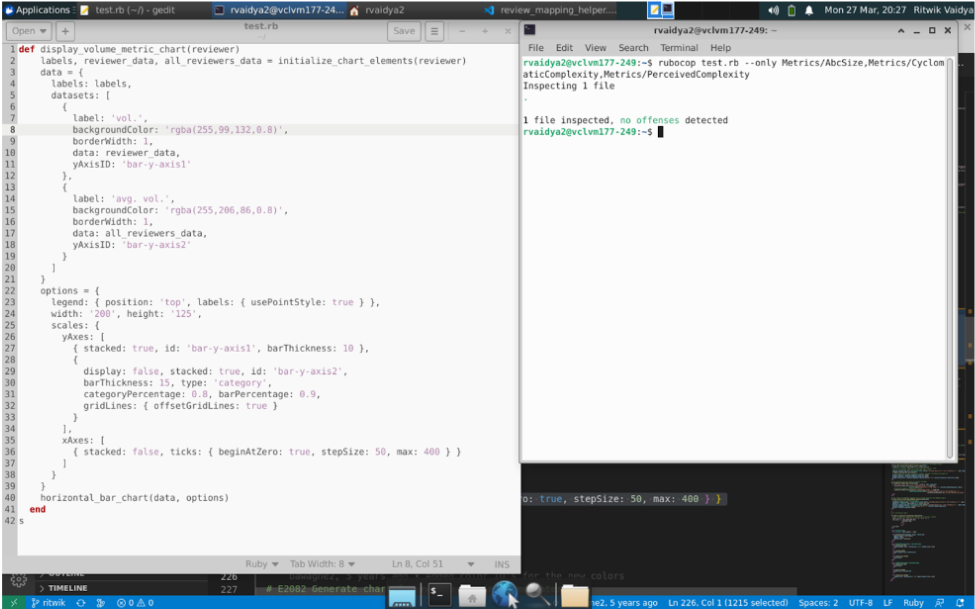
2)def display_tagging_interval_chart(intervals)
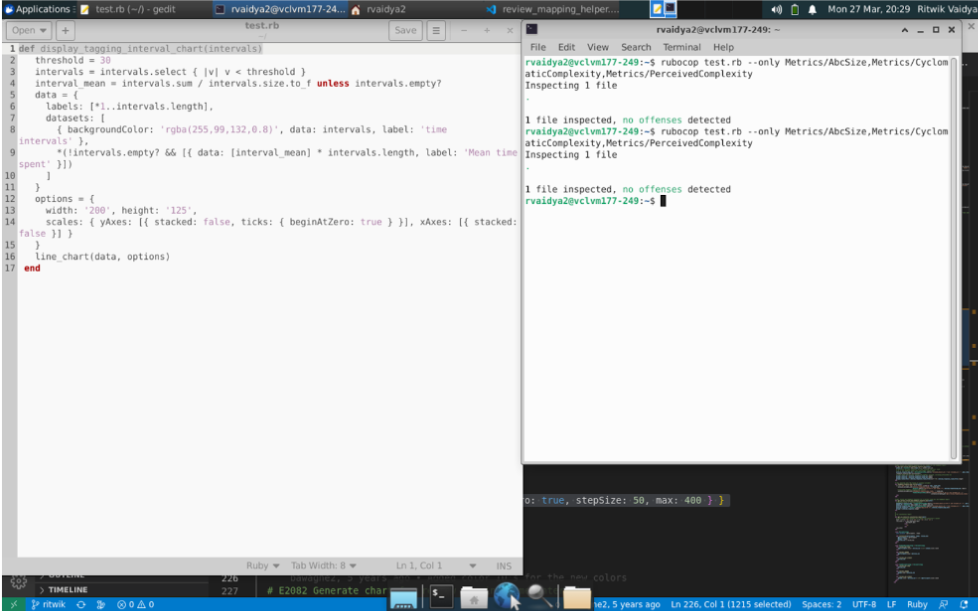
3)def sort_reviewer_by_review_volume_desc
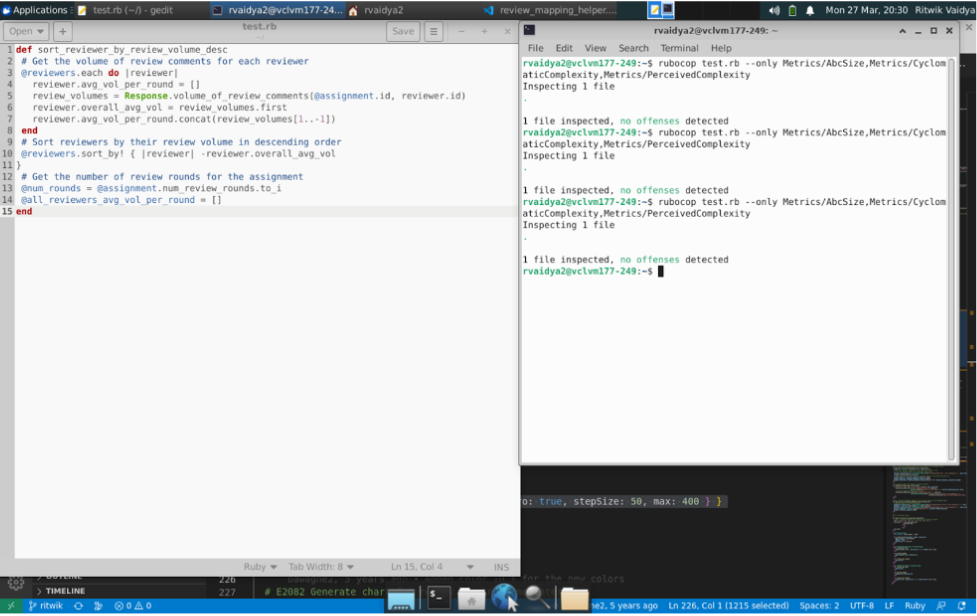
4)def initialize_chart_elements(reviewer)
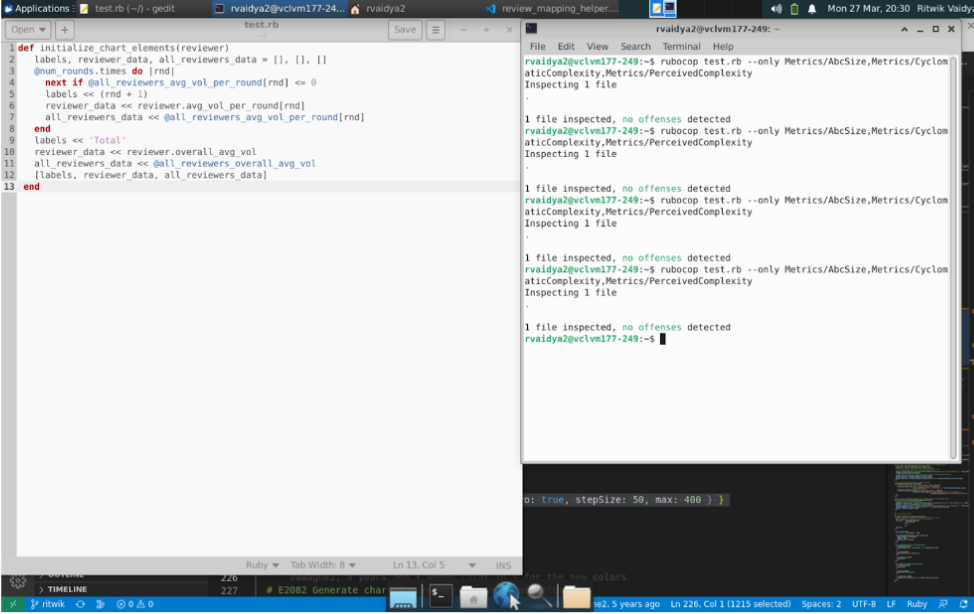
5)def calculate_key_chart_information(intervals)
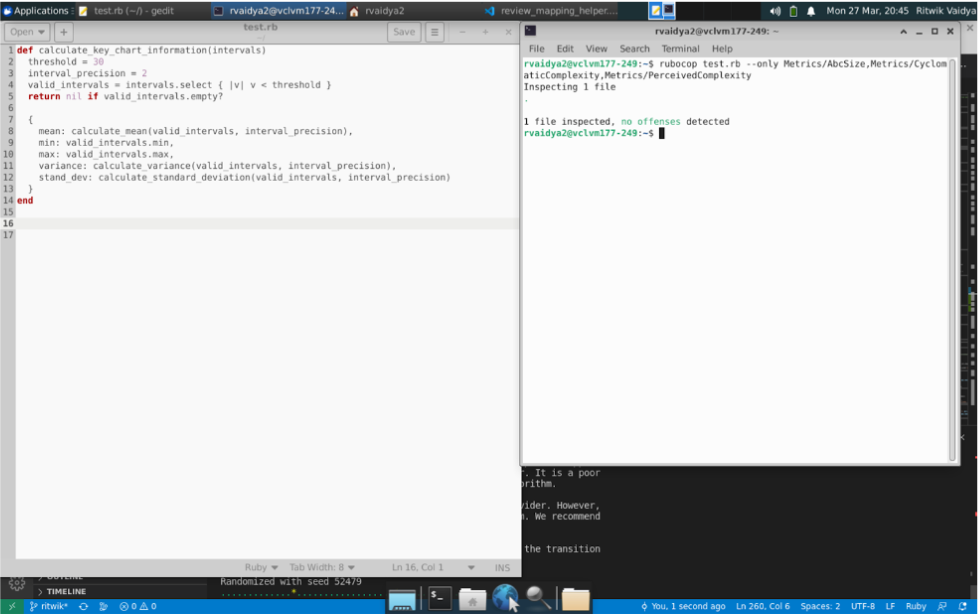
6)def review_metrics(round, team_id)
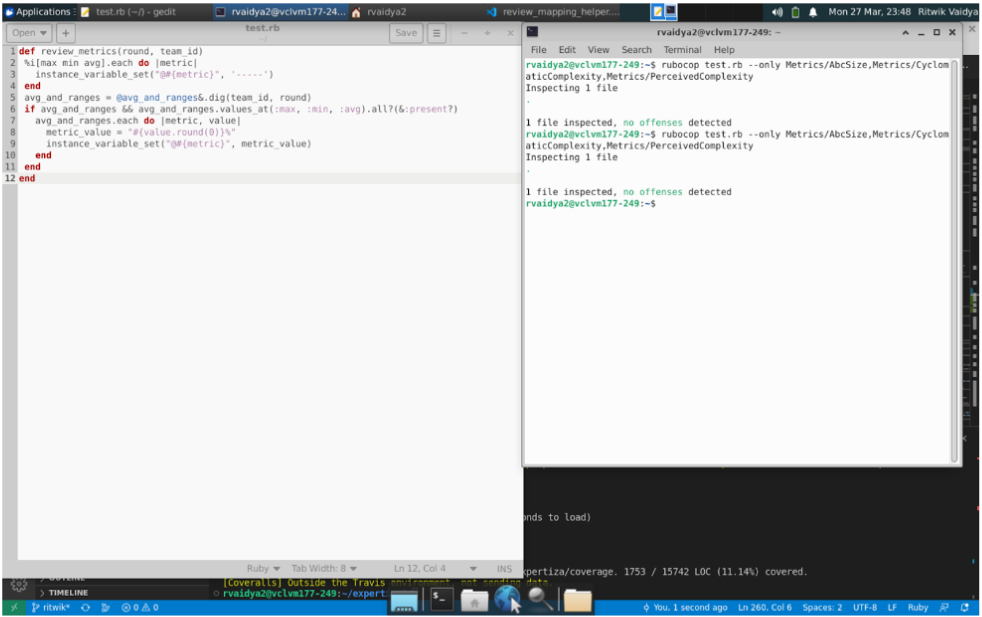
7)def get_data_for_review_report(reviewed_object_id, reviewer_id, type)
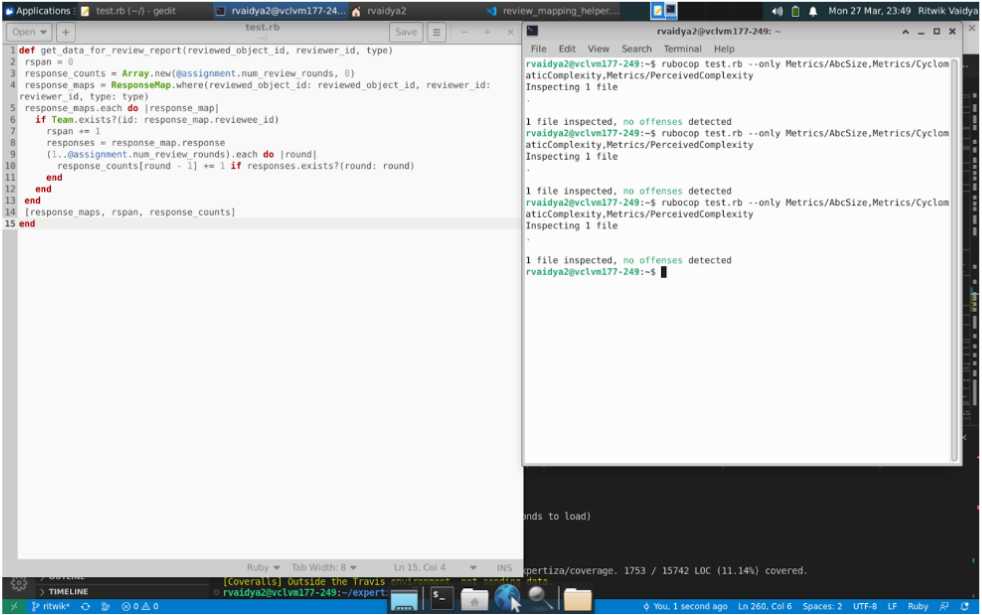
8)def get_team_color(response_map)
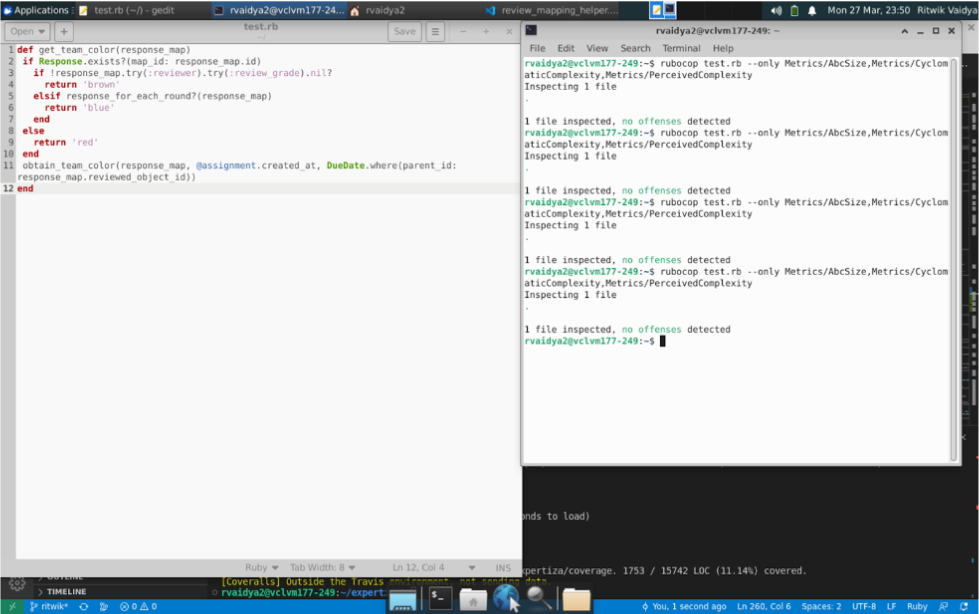
9)def submitted_within_round?(round, response_map, assignment_created, assignment_due_dates)
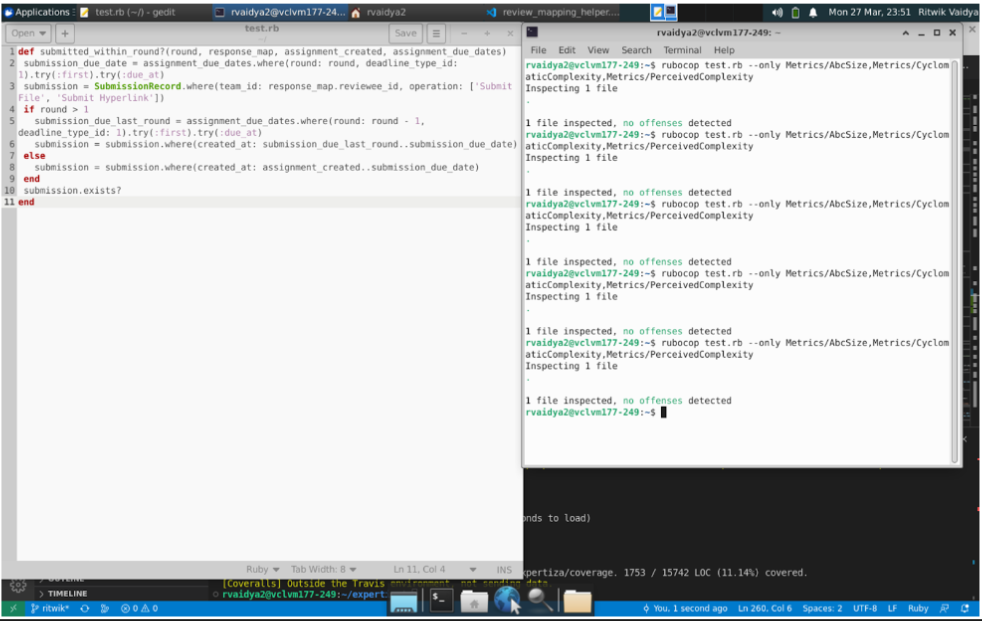
10) def get_data_for_review_report(reviewed_object_id, reviewer_id, type)
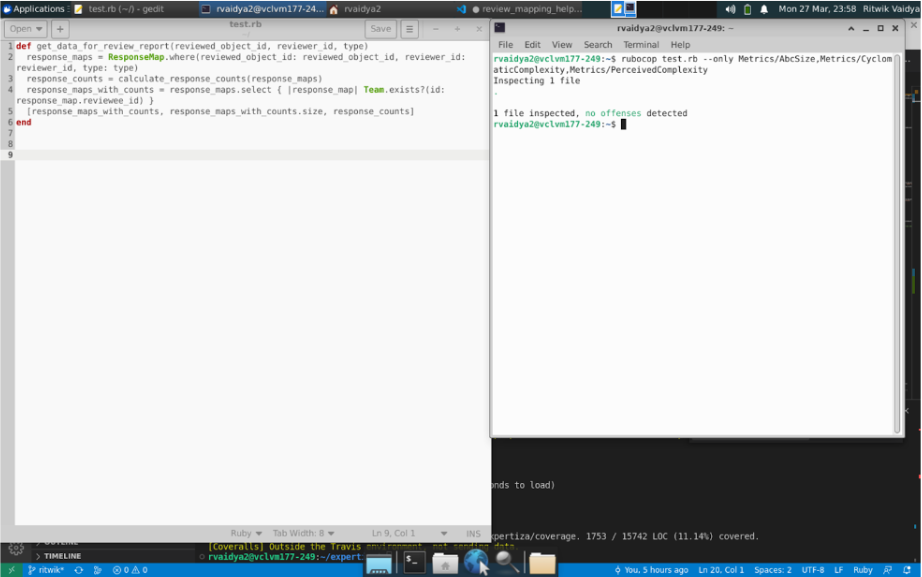
11) def get_awarded_review_score(reviewer_id, team_id)
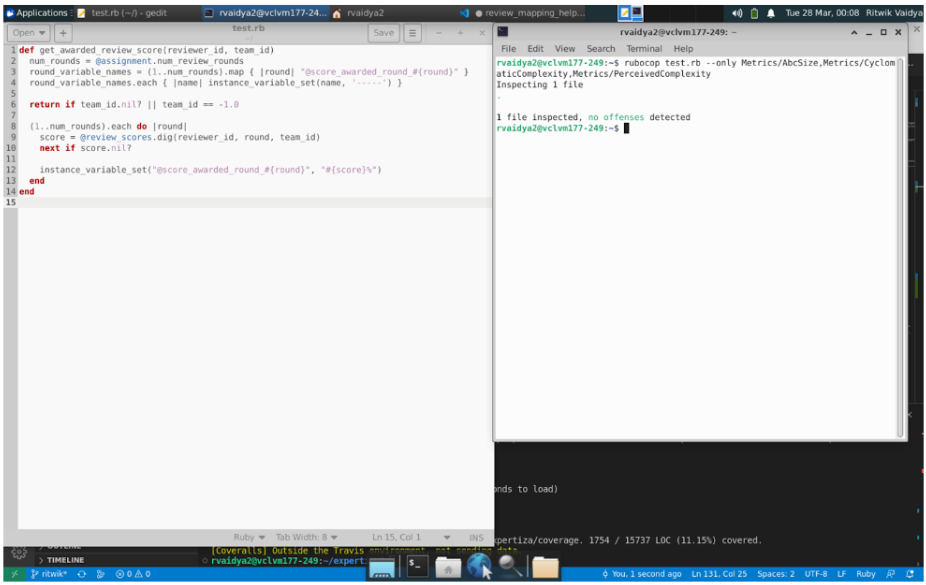
12)def list_review_submissions(participant_id, reviewee_team_id, response_map_id)
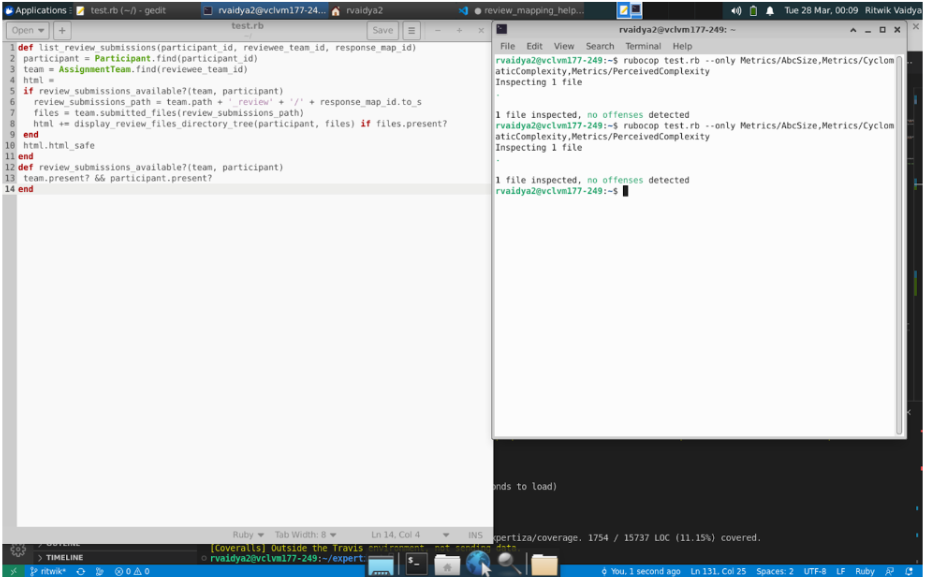
13) def check_submission_state(response_map, assignment_created, assignment_due_dates, round, color)
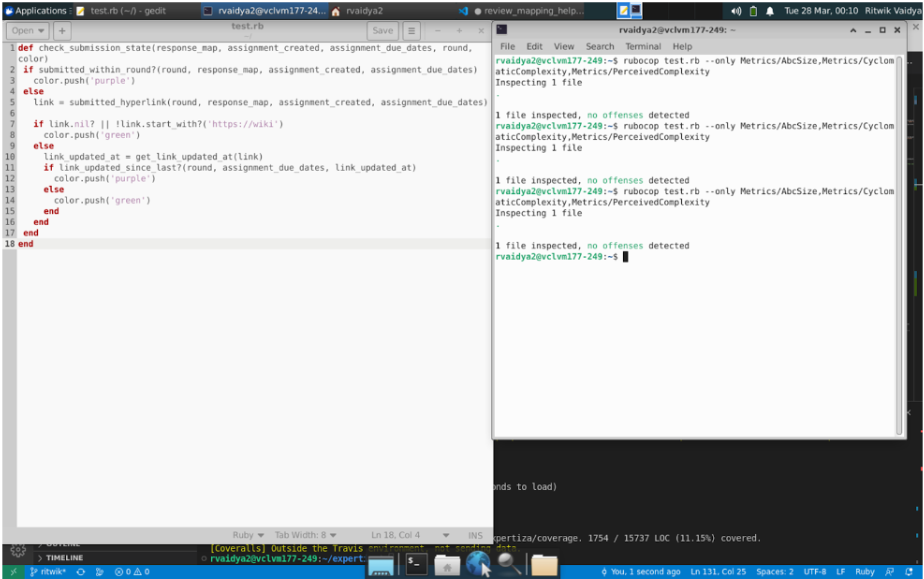
References
[ https://github.com/expertiza/expertiza/pull/1526 ]
[ https://github.com/ArshdeepSinghSyal/expertiza/tree/beta ]
Project Mentors
1) Edward Gehringer (efg@ncsu.edu)
2) Jialin Cui (jcui9@ncsu.edu)
Team Members
1) Kunal Shah (kshah24@ncsu.edu)
2) Ritwik Vaidya (rvaidya2@ncsu.edu)
3) Dakshil Kanakia (drkanaki@ncsu.edu)